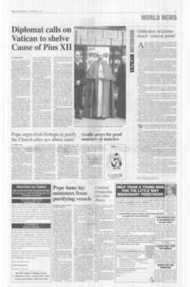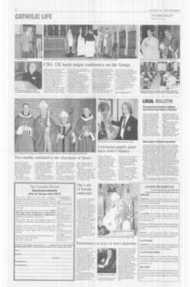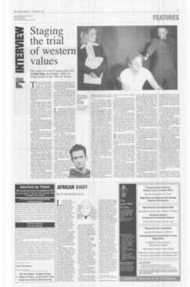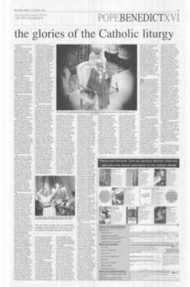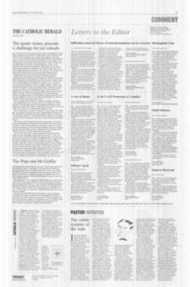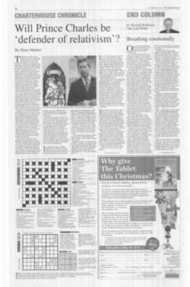Page 12, 3rd November 2006
Page 12

Report an error
Noticed an error on this page?If you've noticed an error in this article please click here to report it.
Tags
Share
Related articles
Triumphal Season's C
Reggae Musical Lacks Bite
‘my Fair Lady’ Watered-down
Toe-tapping Millie Fails To Score A Little Matter
Sweet Charity
A darker kind of musical
THEATRE REVIEW
ROBERT TANITCH
For most people the John Kander-Fred Ebb Broadway musical Cabaret means the 1972 film version, directed and choreographed by the great Bob Fosse, with Liza Minnelli as Sally Bowles and Joel Grey as the master of ceremonies. Minnelli and Grey were wonderful; but Minnelli's dazzling performance had nothing to do with Sally Bowles, whom Christopher Isherwood had immortalised in his Berlin novels.
The whole point about Sally Bowles — the star attraction at The Kit Kat Club, a transvestite nightclub in Berlin in 1931 — was that she sang badly without any expression and with her hands down by her side. The crass, insensitive and infantile Sally was mediocre. She was never going to be a star. Minnelli was a star and her cabaret acts were a knockout. When she sang "Everybody is a Loser" she sounded like her mother, Judy Garland. Audiences expecting a repeat along Minnelli lines at a production currently being staged at the Lyric Theatre will be disappointed. Compared to Minnelli, Anna Maxwell Martin is underwhelming as Sally Bowles, but she is actually truer to the character Isherwood described as "fatale as an after-dinner mint".
The Kit Kat Club is presided over by the leering, sneering and unappealing Emcee (a totally unrecognisable James Dreyfus). The relentlessly crude, in-your-face choreography by Javier De Frutos is a symbol for the tawdry, vulgar, decadent Berlin, which was about to be swept away. Sheila Hancock is touching as the German landlady, who realises that this isn't a good moment to be marrying a Jew.
Rufus Norris's brutal, bleak and expressionistic production bears no relation to the film. The Cabaret at the Lyric Theatre is for those who want to see a play with music, which traces the rise of Nazi Germany. There are two striking uses of nudity. The first is a celebration of Aryan tibermensch, which is used as a background to the Third Reich hymn "Tomorrow Belongs to Me". The second, which closes the show, shows a group of Jews huddled together in the falling snow about to enter the gas chambers.
David Mamet's The Cryptogram at the Donmar is set in Chicago in 1959, the year his parents separated. He was 10 years old. A young boy can't get to sleep. He knows something is going on but he doesn't know what. He keeps coming down a long and spooky flight of stairs to find out. His father, who had promised to take him on a trip, hasn't come home. The dialogue acts like a parody of Mamet's highly stylised syntax, with all those fractured sentences and his familiar trademark of making his characters continuously echo the last word of the last sentence.
Kim Cattrall is impressive as the boy's mother, especially when she realises that her husband has gone off with another woman and becomes hysterical, taking her anger out on her son. Causall is the star name but the star role is actually the boy. The action is seen through his eyes. Oliver Coopersmith's maturity and command of Mamet's dialogue is amazing. The production, tightly directed by Josie Rourke, lasts 65 tantalising minutes. The play isn't either as accessible or as satisfying as Mainers more familiar dramas — American Bi&do,Glengarry Glen Ross and Oleanna — and audiences hanging in there, desperately trying to decipher Mamet's code, may feel cheated.
The re-opening of the refurbished Young Vic is a cause for celebration. A revival of the Jonathan Dove-David Lan community opera, Tobias and the Angel, featuring a cast of over 100 and including pmfessionals and local amateurs, adults and children, was the perfect opener. A young Jew goes on a journey to find some medicine which will give his father back his sight. He returns home with the medicine and a wife, John Fulljames's staging on a diagonal traverse was lively and pictorially inventive. The music and the singing were a delight.
The Maly Drama Theatre of St Petersburg came to the Barbican. Lev Dodin's radical production of King Lear, acted in Russian with surtitles, took far too many liberties with the text and characterisations. One unhelpful innovation was to have no lighting in those scenes in which Gloucester appeared after he had gone blind.
blog comments powered by Disqus






